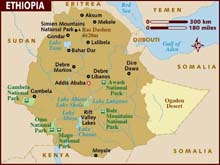
The Fogarty International Center of the National Institutes of Health (NIH) has awarded a grant to Emory University to help launch a training initiative designed to improve the research, treatment and control of tuberculosis (TB) in Ethiopia, where the disease is considered a public health emergency, with high rates of disease and TB-related death.
The five-year Emory grant totaling more than $970,000 is one of six new grants to support new and ongoing infectious disease research training in five low- and middle-income countries. Funding from the NIH Fogarty's Global Infectious Disease Research Training program will enhance the efforts of grantees at Emory and other institutions to build human capacity and conduct research on diseases that are endemic in their home countries. The five-year awards will fund new and ongoing projects in Bangladesh, China, Ethiopia, Kenya and Pakistan.
Ethiopia is one of the 22 high burden countries that account for more than 80 percent of the world’s TB cases and is also a high burden country for multidrug resistant (MDR) TB. Historically Ethiopia has had one of the lowest TB case detection rates. New tools are needed to enhance TB control in Ethiopia and globally, including new and better drugs, diagnostics and an effective vaccine. Also needed are better implementation and effective use of existing tools.
"One of the biggest barriers to improving control of TB in Ethiopia is the small number of scientists and health professionals with the knowledge and expertise to conduct research that can lead to better public health practices," says principal investigator Henry M. Blumberg, MD, professor of medicine (infectious diseases), epidemiology, and global health at the Emory University School of Medicine.
The Ethiopia-Emory TB Research Training Program will enhance TB research capacity, particularly at the three collaborating Ethiopian institutions (Armaeur Hansen Research Institute, Ethiopian Health and Nutrition Research Institute and Addis Ababa University), as well as the public health infrastructure.
"Malaria, tuberculosis, rotavirus and other dangerous pathogens still pose a serious threat to populations in developing countries, particularly to their poorest citizens," says Fogarty Director Dr. Roger I. Glass. "This funding will help clinicians and health workers combat these diseases, while building a critical mass of researchers and support staff at grantee institutions."
The Fogarty International Center is dedicated to advancing the mission of the NIH by supporting and facilitating global health research conducted by U.S. and international investigators, building partnerships between health research institutions in the U.S. and abroad, and training the next generation of scientists to address global health needs.
Other grantees for these NIH Global Infectious Diseases grants in addition to Emory include the University of North Carolina at Chapel Hill, New Mexico Health Sciences Center, Johns Hopkins University, Yale University and Aga Khan University in Pakistan.
